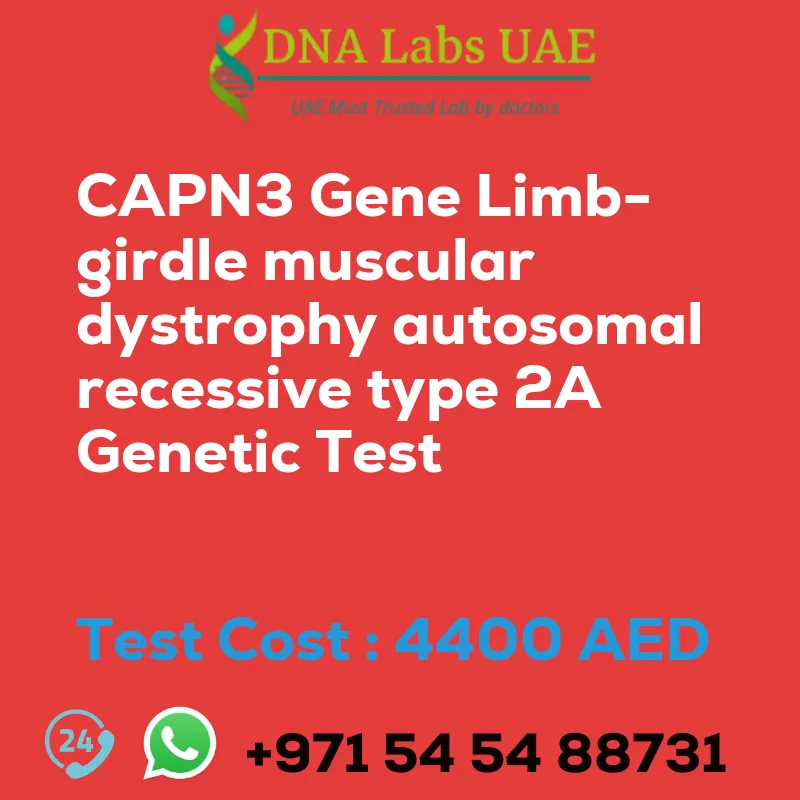CAPN3 Gene Limb-girdle muscular dystrophy autosomal recessive type 2A Genetic Test
At DNA Labs UAE, we offer the CAPN3 Gene Limb-girdle muscular dystrophy autosomal recessive type 2A Genetic Test. This test is designed to analyze the CAPN3 gene for any mutations or variations that may be causing limb-girdle muscular dystrophy.
Test Components and Price
The price of the CAPN3 Gene Limb-girdle muscular dystrophy autosomal recessive type 2A Genetic Test is AED 4400.0. The test requires a blood sample or extracted DNA, or one drop of blood on an FTA Card.
Report Delivery
After the sample is collected, the report will be delivered within 3 to 4 weeks.
Method
The CAPN3 Gene Limb-girdle muscular dystrophy autosomal recessive type 2A Genetic Test utilizes NGS (Next-Generation Sequencing) technology.
Test Type
This test is specifically designed for the diagnosis of neurological disorders, such as limb-girdle muscular dystrophy.
Doctor
The test is performed by a neurologist.
Test Department
The CAPN3 Gene Limb-girdle muscular dystrophy autosomal recessive type 2A Genetic Test is conducted in our Genetics department.
Pre Test Information
Prior to undergoing the CAPN3 Gene Limb-girdle muscular dystrophy autosomal recessive type 2A Genetic Test, it is important to provide the clinical history of the patient. Additionally, a genetic counseling session will be conducted to draw a pedigree chart of family members affected with the condition.
Test Details
The CAPN3 gene is associated with a type of limb-girdle muscular dystrophy called autosomal recessive type 2A (LGMD2A). This genetic disorder is characterized by progressive muscle weakness and wasting, primarily affecting the muscles of the hips and shoulders.
NGS (Next-Generation Sequencing) is a genetic testing technique that allows for the simultaneous analysis of multiple genes or even the entire genome. In the case of LGMD2A, NGS can be used to analyze the CAPN3 gene for any mutations or variations that may be causing the disease.
The NGS genetic test for CAPN3 gene mutations can help confirm a diagnosis of LGMD2A and provide valuable information for genetic counseling, disease management, and potential treatment options. It can also be used for carrier testing in individuals with a family history of the condition.
It’s important to note that a genetic test for LGMD2A should be performed by a qualified healthcare professional or genetic counselor who can interpret the results and provide appropriate guidance and support.
| Test Name | CAPN3 Gene Limb-girdle muscular dystrophy autosomal recessive type 2A Genetic Test |
|---|---|
| Components | |
| Price | 4400.0 AED |
| Sample Condition | Blood or Extracted DNA or One drop Blood on FTA Card o |
| Report Delivery | 3 to 4 Weeks |
| Method | NGS Technology |
| Test type | Neurological Disorders |
| Doctor | Neurologist |
| Test Department: | Genetics |
| Pre Test Information | Clinical History of Patient who is going for CAPN3 Gene Limb-girdle muscular dystrophy, autosomal recessive type 2A NGS Genetic DNA Test A Genetic Counselling session to draw a pedigree chart of family members affected with CAPN3 Gene Limb-girdle muscular dystrophy, autosomal recessive type 2A |
| Test Details | The CAPN3 gene is associated with a type of limb-girdle muscular dystrophy called autosomal recessive type 2A (LGMD2A). This genetic disorder is characterized by progressive muscle weakness and wasting, primarily affecting the muscles of the hips and shoulders. NGS (Next-Generation Sequencing) is a genetic testing technique that allows for the simultaneous analysis of multiple genes or even the entire genome. In the case of LGMD2A, NGS can be used to analyze the CAPN3 gene for any mutations or variations that may be causing the disease. The NGS genetic test for CAPN3 gene mutations can help confirm a diagnosis of LGMD2A and provide valuable information for genetic counseling, disease management, and potential treatment options. It can also be used for carrier testing in individuals with a family history of the condition. It’s important to note that a genetic test for LGMD2A should be performed by a qualified healthcare professional or genetic counselor who can interpret the results and provide appropriate guidance and support. |







